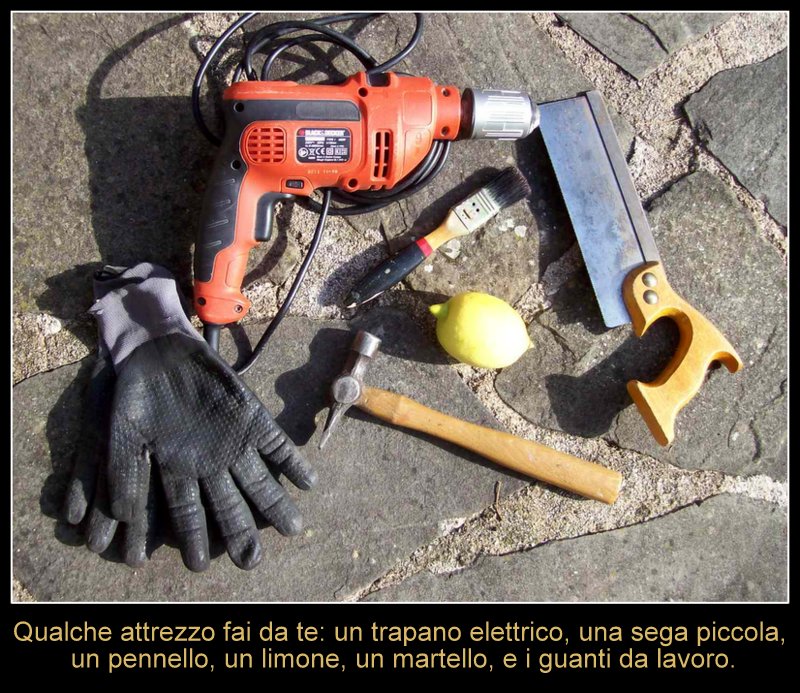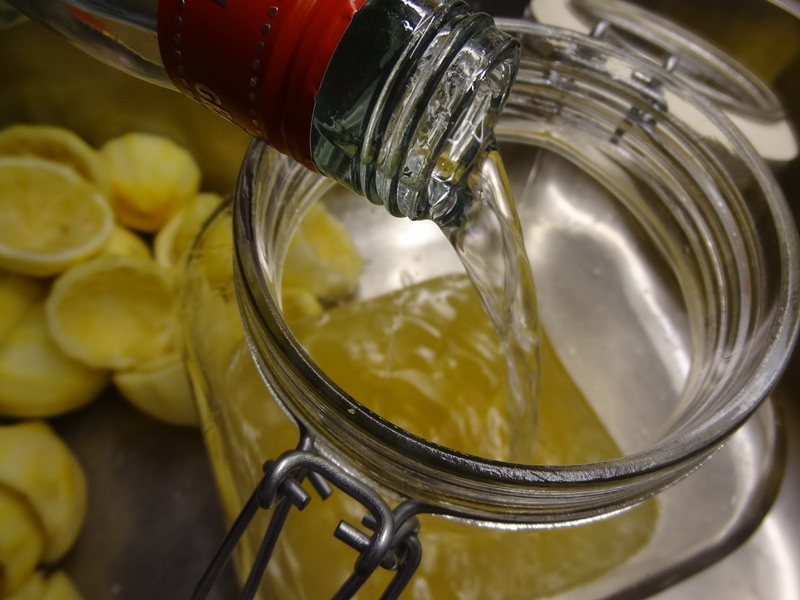Oh dear, not one of you noticed the lemon! I was expecting a deluge of comments to the tune of “what on earth is a lemon doing amongst a bunch of DIY tools?” And yet there it is dear readers, right in the middle of the photo that appeared in my blog Attrezzi Fai Da Te, and not a single comment!

Yes, a lemon: you can’t paint with it, you can’t drill with it, you can’t saw or hammer with it. But you can make some delicious limoncello. Here’s how.
Ingredienti:
10 limoni non trattati; 1 litro di alcol puro da liquore a 95°; 750 grammi di zucchero; 750 cl di acqua
Ingredients:
10 unwaxed lemons; 1 litre of pure alcohol for liqueurs at 95°; 750 grams of sugar; 750 centilitres of water (roughly 13 imperial pints or 16 US pints)
Preparation:
Wash and dry the lemons. With a sharp knife carefully remove the yellow part of their rinds. Put the rinds in a big glass jar with an airtight seal. Pour the alcohol over the lemon rinds and seal the jar. Store the jar in a dark place, shaking it at least once a day.
After 10 days filter the liquid. Put the sieved lemon rinds in a saucepan with the water and the sugar, and boil gently for 5 minutes, or until the sugar is completely dissolved. Let it cool down. Pour the lemon scented alcohol into the syrup, mix well and then pour everything into a big jar. Seal it and leave it to infuse in a dark place.
After 15 days, filter well until it is perfectly clear (you might need to repeat the operation once more), and bottle. Leave the limoncello to rest for at least 2 months before trying it. Come, be patient, it’s worth it. N.B. limoncello should be drunk chilled.

Photo CC by Pernilla Rydmark
Suggestion:
Here’s a nice recipe to use up the juice from the 10 peeled lemons. Squeeze the lemons, add sugar to taste, and mix well until the sugar is completely dissolved. Put the sweetened lemon juice into an ice cubes container, and freeze it. Use a few at a time diluted with water to make a delicious refreshing drink.







Comments:
Frau Pizzawürstel:
Thank you for sharing the recipe :). It s always nice to compare the amount of lemons different recipes recommend (we also use 10 per liter alc) in our homemade limoncello. we always do quite a lot. It s much quicker and you have much less white lemonskin if you use a potatopeeler /asparagus-peeler in stead of a small knife!
Greetings from Germany
Frau Pizzawuerstel
Maria:
Are the rinds the outermost part of the lemon? The “shell” or “casing”, if you will.
Is that the only part of the lemon that’s used for the limoncello?
Serena:
@Maria Salve Maria! the rinds are the outermost part of the lemon. You can use a potato-peeler. The white layer is very bitter. Strangely enough, the juice is not used, that’s why I suggested another recipe to use all that lemon juice.
Saluti da Serena
Donna:
Probably everyone noticed it but no one said anything. We all should probably give more feedback so you know we are here. I love your blog and follow it faithfully. I just rarely comment. Please continue this wonderful project! Grazie!
Serena:
@Donna Grazie mille Donna!
Annie C:
hear hear – I second Donna – love your blog and sharing your adventures in love… in deep appreciation
thank you
Geoff:
@Annie C Actually, I prefer adventures in love, but life works too! Thanks for your feedback Annie, a presto, Geoff 🙂
Annie C:
actually that was meant to say adventures in life! but hey, love works too. 🙂
Sharon Wells:
I noticed the lemon! I thought maybe you were saving it’s significance for another blog — and I was right. I’ve heard it said that if life gives you lemons, make a gin and tonic, but this is a much sweeter alternative!
🙂
Rosalind:
I also noticed the lemon and it reminded me of when my 3 year old grandson wandered in muttering, more to himself than to me: “Il faut un peu de Paic citron”. He and his older brother must have been tinkering with one of their many old bikes or carts. Admittedly washing-up liquid (lemon-perfumed or otherwise) makes more sense than an actual lemon in the DIY toolbox.
Then, since my head is a sieve, I forgot to check in the text whether Geoff actually had a secret use for the lemon.